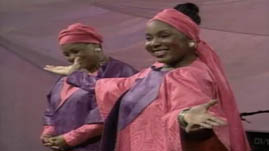Teachers' Domain - Digital Media for the Classroom and Professional Development
User: Preview



Dhana Bradley Donaldson and Priscilla Hancock Cooper, cofound¬ers of the former Theatre Workshop of Louisville, present a “poetic concert” featuring the words of three African-American writers. They perform “Ain’t I a Woman?” the famous speech made by 19th-century abolitionist and feminist Sojourner Truth; “Alabama Centennial,” a poem about the Civil Rights movement of the 1960s by Naomi Long Madgett; and Nikki Giovanni’s popular self-love poem, “Ego Tripping.”
This resource is part of the Civil War Era collection. Find additional arts resources for your classroom at the KET Arts Toolkit website.
Words Like Freedom
Words Like Freedom explores the historic struggle of black people in America for freedom and equality while celebrating the African-American legacy of the spoken word. This segment includes performances of works by three African-American women writers: “Ain’t I a Woman?” by 19th-century abolitionist and feminist Sojourner Truth; “Alabama Centennial,” a poem about the civil rights movement of the 1960s by Naomi Long Madgett; and Nikki Giovanni’s popular self-love poem, “Ego Tripping.”
Sojourner Truth was born in 1797 as Isabella Baumfree. At the age of 46 she changed her given name to Sojourner, which means “one who stays a short time.” Truth was an appropriate surname as well for a woman who was gaining momentum as a spokesperson for women’s rights and the abolition of slavery.
During her lifetime, Truth endured slavery and an abusive marriage. During the Civil War, she traveled to Washington D.C., where she sang and preached to make money for black soldiers serving in the Union Army. After the war, she continued her fiery rhetoric, giving voice to the cause of human rights. She delivered one of her most famous speeches, “Ain’t I a Woman?”, at the Women’s Rights Convention in 1851 in response to a speaker who had insisted that males were due extraordinary rights and privileges based on the superior intellect.
“Alabama Centennial” is a poem written by Naomi Long Madgett and included in her third book of poems, Star by Star, published in 1965. It is a political poem in that it heralds the importance of civil rights issues to African Americans in the 1950s and 1960s. The poem chronicles African-Americans’ struggles for freedom by mentioning certain historical protests and marches. “Alabama Centennial” is passionate, proclaiming that “the chain of patient acquiescence” has broken and the time for equality and dignity is “Now!”
The third literary work included in this segment is Nikki Giovanni’s poem “Ego Tripping.” Giovanni’s poem was first published in 1972 in a collection of poetry titled My House. In the poem, Giovanni celebrates being black and female as she delves into history, visiting ancient African civilizations, the Egyptians, the Carthagians, and the Ethiopians. The poem is rich in history as it explores ancient cultures and their contribution to modern society. Giovanni is one of the most widely read American poets and remains committed to the fight for civil rights and equality.
 Loading Standards
Loading Standards